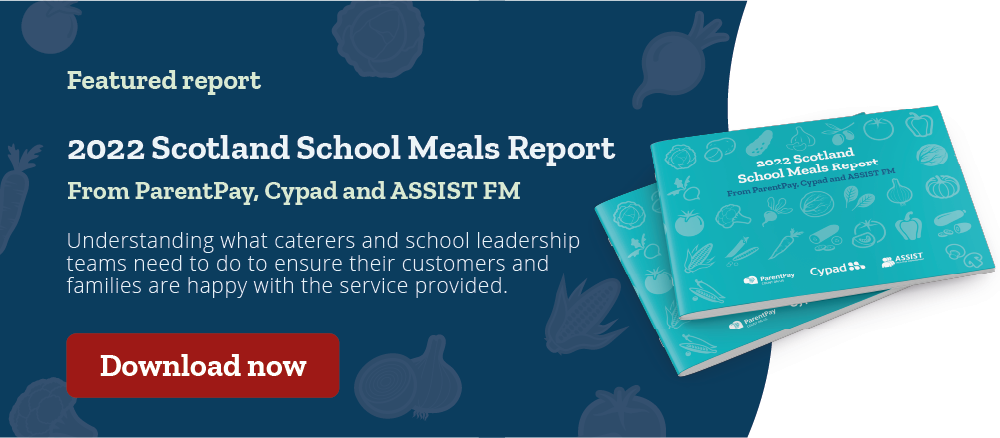Co-written with Stephen Sawers, Head of Catering and Facilities Management at Glasgow City Council
This blog is the final instalment of our co-written blog series with ASSIST FM, taking a closer look at school meals in Scotland and beyond. Our first blog, More Than a Meal, introduced the role of school caterers over and above simply providing school meals. The second, Let’s Cook, examined how school catering teams can teach children valuable cooking skills. The third blog, Sustainability and Education, analysed how school caterers are striving to make their operations greener.
In addition to these collaborative blogs, we recently worked with ASSIST FM to produce our 2022 Scotland School Meals Report; you can download the 2022 Scotland School Meals Report online.
How improving collaboration benefits school meals
Collaboration is central to success in school meal provision, especially with industry associations to gain insights into achieving your school or local authority’s goals.
Like many local authorities, Glasgow has been on a journey over the past few years, exploring how effective communication and collaborative working aids the delivery of services across Scotland. Stephen Sawers, Head of Catering and Facilities Management at Glasgow City Council, explains to us that as the country’s largest local authority, Glasgow plays an important role in the national effort to provide Scotland’s young people with nutritious school meals. They meet the challenge and fulfil their responsibilities through the tireless work of their front-line staff across 141 primary schools and 30 secondary schools.
In 2019, Glasgow began their partnership with the Soil Association through their Food For Life Served Here programme. The programme “focus[es] on the power of public food and its potential to have a positive impact on health, the environment, and the local economy”, and gives awards to local authorities to mark their school meals service reaching a high standard of ingredient freshness and sustainability.
Stephen tells us that Glasgow was proud to receive its Food For Life Bronze Award in June 2021. Achieving this award helped the local authority build on the goals in its Glasgow City Food Plan, and supported the city’s sustainable messaging leading up to hosting COP 26 in November 2021. Stephen goes on to describe how hosting the global summit was a fantastic opportunity to showcase Glasgow on the world stage, and sparked important conversations among young people about sustainability and how the food we consume is a key component to living in a way which benefits the planet.
Collaboration with other local authorities is another central way in which Glasgow is embracing partnerships to drive improvements. Stephen explains, “local authorities work very closely, and through ASSIST FM, networking and collaboration happens daily to drive consistency and standards across the country. Rarely a day goes by without emails asking questions and sharing information!”
The Local Government Association has published guidance for local authorities around how they can work collaboratively with schools to help drive improvement. They recommend that local authorities develop a vision for the area that considers contextual factors, so that the plan works in practice, and set out clear priorities and roles for everyone involved in executing the vision. Local authorities can support this by enabling regular communication between schools to identify and work together to tackle some of the problems they are facing. The guidance also highlights the importance of local authorities allocating capacity to school collaboration and improvement to ensure it receives the capacity and resources needed.
When striving to improve school meals, one of the most valuable partnerships local authorities and schools can foster is one with parents. Our Scotland School Meals Report gathered 15,964 responses from parents across the country, a robust sample size which helped us to understand what caterers and school leadership teams in Scotland need to do to ensure their clients and families are happy with the service provided.
Finally, Stephen highlights the importance of collaborating with suppliers. He says, “We enjoy a very close and strong relationship with our suppliers. The relationship isn’t just about supplying food, it’s now extended to [be about] how we can work better together and add value through educating our children”.
Tips for better collaboration
The first and most important way to improve collaboration for better school meals is to take every opportunity to work together. Being open to challenging how things are currently done, regularly communicating with other local authorities as Glasgow did, and partnering with industry organisations allows for the sharing of ideas and other ways of working that might be what your meal service needs.
Attending industry events brings valuable networking opportunities that you wouldn’t find elsewhere. The ASSIST FM Conference, hosted annually in Glasgow, features speakers and seminars from experts in the facilities management industry, as well as a supplier exhibition and awards ceremony recognising outstanding contributions to local authorities. Similarly, the annual conference held by LACA The School Food People is the only national event dedicated to the school meals sector, and is essential for anyone involved in the provision of school meals.
